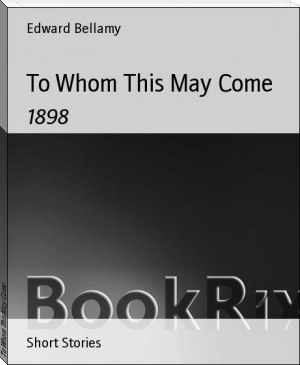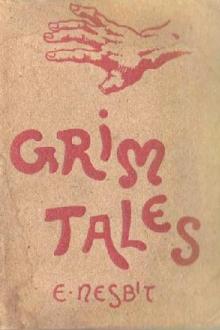A Summer Evening's Dream - Edward Bellamy (romantic books to read txt) 📗

- Author: Edward Bellamy
Book online «A Summer Evening's Dream - Edward Bellamy (romantic books to read txt) 📗». Author Edward Bellamy
fallen into the spirit of her part that she was really crying as she ended. Her tears completed Mr. Morgan's mental confusion, and he absolutely did not know whom he was addressing or where he was himself, as he cried, "No, no, Mary! Don't cry! It shall not be; it shall never be."
Lightly withdrawing her hand from his arm, she glided like a sprite from his side, and was lost in the shadows, while her whispered words still sounded in his ear, "Good-by for thirty years!"
A moment after, three notes, clear as a bird's call, sounded from the direction whither she had vanished, and Miss Rood's companion, breaking off short a remark on the excessive dryness of the weather, bowed awkwardly and also disappeared among the shadows.
When Miss Rood laid her hand on Mr. Morgan's arm to recall him to the fact that they were now alone together, he turned quickly, and his eyes swept her from head to foot, and then rested on her face with an expression of intense curiosity and a wholly new interest, as if he were tracing out a suddenly suggested resemblance which overwhelmed him with emotion. And as he gazed, his eyes began to take fire from the faded features on which they had rested so many years in mere complacent friendliness, and she instinctively averted her face.
Long intimacy had made her delicately sensitive to his moods, and when he drew her arm in his and turned to walk, although he had not uttered a word, she trembled with agitation.
"Mary, we have had an extraordinary experience to-night," he said. The old dreaminess in his voice, as of one narcotized or in a trance, sometimes a little forced, as of one trying to dream, to which she had become accustomed, and of which in her heart of hearts she was very weary, was gone. In its place she recognized a resonance which still further confused her with a sense of altered relations. His polarity had changed: his electricity was no longer negative, but positive.
Her feminine instinct vaguely alarmed, she replied, "Yes, indeed, but it is getting late. Had n't we better go in?" What lent the unusual intonation of timidity to her voice? Certainly nothing that she could have explained.
"Not quite yet, Mary," he answered, turning his gaze once more fully upon her.
Her eyes dropped before his, and a moment after fluttered up to find an explanation for their behavior, only to fall again in blind panic. For, mingling unmistakably with the curiosity with which he was still studying her features, was a newborn expression of appropriation and passionate complacency. Her senses whirled in a bewilderment that had a suffocating sweetness about it. Though she now kept her eyes on the ground, she felt his constant sidewise glances, and, desperately seeking relief from the conscious silence that enveloped them like a vapor of intoxicating fumes, she forced herself to utter the merest triviality she could summon to her lips: "See that house." The husky tones betrayed more agitation than the ruse concealed.
He answered as irrelevantly as she had spoken, "Yes, indeed, so it is." That was their only attempt at conversation.
For a half hour--it might have been much more or much less--they walked in this way, thrilling with the new magnetism that at once attracted and estranged them with an extraordinary sense of strangeness in familiarity. At length they paused under the little porch of Miss Rood's cottage, where he commonly bade her good-evening after their walks. The timidity and vague alarms that had paralyzed her while they were walking disappeared as he was about to leave her, and she involuntarily returned his unusual pressure of her hand.
A long time after, behold her still encircled in his arms, not blushing, but pale and her eyes full of a soft, astonished glow! "Oh, Robert!" was all she had said after one first little gasp.
They never met George or Mabel again. Mrs. Morgan learned subsequently that two young people from the city answering their description had been guests at the opposite house, and had left Plainfield the morning after the events hereinbefore set forth, and drew her conclusions accordingly. But her husband preferred to cherish the secret belief that his theory that memories might become visible had proved true in one instance at least.
Imprint
Lightly withdrawing her hand from his arm, she glided like a sprite from his side, and was lost in the shadows, while her whispered words still sounded in his ear, "Good-by for thirty years!"
A moment after, three notes, clear as a bird's call, sounded from the direction whither she had vanished, and Miss Rood's companion, breaking off short a remark on the excessive dryness of the weather, bowed awkwardly and also disappeared among the shadows.
When Miss Rood laid her hand on Mr. Morgan's arm to recall him to the fact that they were now alone together, he turned quickly, and his eyes swept her from head to foot, and then rested on her face with an expression of intense curiosity and a wholly new interest, as if he were tracing out a suddenly suggested resemblance which overwhelmed him with emotion. And as he gazed, his eyes began to take fire from the faded features on which they had rested so many years in mere complacent friendliness, and she instinctively averted her face.
Long intimacy had made her delicately sensitive to his moods, and when he drew her arm in his and turned to walk, although he had not uttered a word, she trembled with agitation.
"Mary, we have had an extraordinary experience to-night," he said. The old dreaminess in his voice, as of one narcotized or in a trance, sometimes a little forced, as of one trying to dream, to which she had become accustomed, and of which in her heart of hearts she was very weary, was gone. In its place she recognized a resonance which still further confused her with a sense of altered relations. His polarity had changed: his electricity was no longer negative, but positive.
Her feminine instinct vaguely alarmed, she replied, "Yes, indeed, but it is getting late. Had n't we better go in?" What lent the unusual intonation of timidity to her voice? Certainly nothing that she could have explained.
"Not quite yet, Mary," he answered, turning his gaze once more fully upon her.
Her eyes dropped before his, and a moment after fluttered up to find an explanation for their behavior, only to fall again in blind panic. For, mingling unmistakably with the curiosity with which he was still studying her features, was a newborn expression of appropriation and passionate complacency. Her senses whirled in a bewilderment that had a suffocating sweetness about it. Though she now kept her eyes on the ground, she felt his constant sidewise glances, and, desperately seeking relief from the conscious silence that enveloped them like a vapor of intoxicating fumes, she forced herself to utter the merest triviality she could summon to her lips: "See that house." The husky tones betrayed more agitation than the ruse concealed.
He answered as irrelevantly as she had spoken, "Yes, indeed, so it is." That was their only attempt at conversation.
For a half hour--it might have been much more or much less--they walked in this way, thrilling with the new magnetism that at once attracted and estranged them with an extraordinary sense of strangeness in familiarity. At length they paused under the little porch of Miss Rood's cottage, where he commonly bade her good-evening after their walks. The timidity and vague alarms that had paralyzed her while they were walking disappeared as he was about to leave her, and she involuntarily returned his unusual pressure of her hand.
A long time after, behold her still encircled in his arms, not blushing, but pale and her eyes full of a soft, astonished glow! "Oh, Robert!" was all she had said after one first little gasp.
They never met George or Mabel again. Mrs. Morgan learned subsequently that two young people from the city answering their description had been guests at the opposite house, and had left Plainfield the morning after the events hereinbefore set forth, and drew her conclusions accordingly. But her husband preferred to cherish the secret belief that his theory that memories might become visible had proved true in one instance at least.
Imprint
Publication Date: 08-16-2010
All Rights Reserved
Free e-book «A Summer Evening's Dream - Edward Bellamy (romantic books to read txt) 📗» - read online now
Similar e-books:





Comments (0)